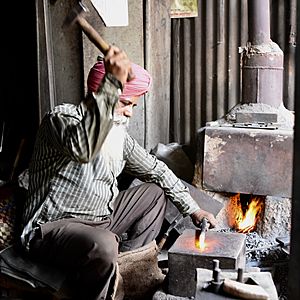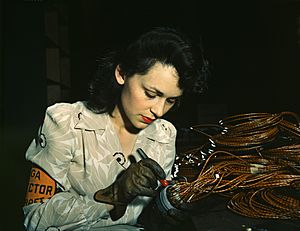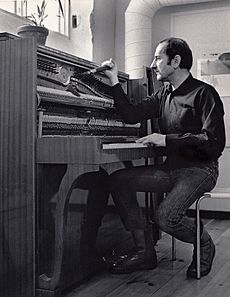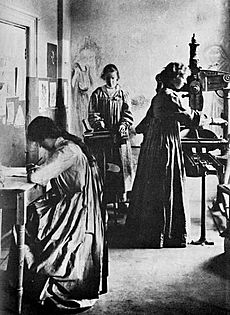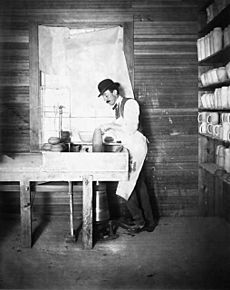Work (human activity) facts for kids
Work is any activity people do on purpose to help themselves, others, or their community. It's how we get the things we need and want. In economics, which is the study of how money and goods are made and used, work is the human effort that helps create goods (like products) and services (like haircuts or teaching) in a society.
Work is super important in all societies, but it looks different depending on where you are. It can be as simple as gathering food by hand or as complex as using advanced machines that do a lot of the physical or even mental tasks for us. Most jobs need special skills, tools, or materials. People throughout history have had many different ideas about work. Humans usually work during the day because we are diurnal (active during the day).
Different cultures can organize jobs or give them different importance. Throughout history, work has been linked to things like power, social groups, tradition, and rights. Because of this, how work is divided among people (called the division of labor) is a big topic in studies about society.
Related words for work include occupation and job. You might also hear about a job title or a profession.
Contents
What is Work?
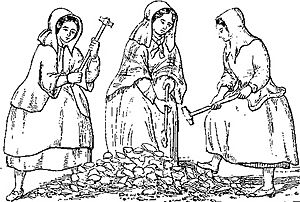
Work can be many different things. It changes based on the place, the tools used, the skills needed, the goals, and the rules around the worker.
It's not always easy to say what counts as work because it depends on the situation. One key feature that often makes an activity "work" is specialization. For example, playing a sport is a job for a professional athlete who earns money from it. But for someone playing for fun, it's just a hobby.
Another common feature of work is that it usually involves some planning or expectation. Think of a paramedic who gives medical care while on duty with all their equipment. This is different from someone giving first aid by chance if they happen to be a bystander in an emergency. Also, simple daily tasks like personal grooming are not usually seen as work.
Sometimes, an activity is seen as productive work only if it leads to a gift, trade, or payment. However, this idea might leave out important activities like volunteering or tasks within a family, such as parenting or housekeeping. Often, deciding what is work and what isn't comes down to what a community generally agrees upon.
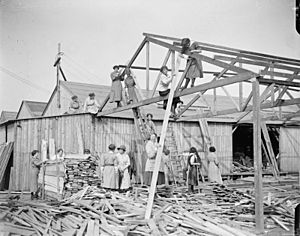
History of Work
People's work habits and ideas about work have changed a lot over time. In hunter-gatherer societies, people worked harder or less hard depending on the season. For example, they worked intensely when plants were ready to be gathered or when animals migrated.
When agriculture developed, people started working more regularly. But work still changed with the seasons. There were times of very hard work, like during harvests, and then quieter periods, such as winters. In early modern times, some beliefs and the start of capitalism encouraged people to see hard work as a good thing.
The rise of slavery made some workers labor more consistently. Later, during the Industrial Revolution, machines made workers keep up a faster pace. Rules were then made about hours of work and the ages of workers. People also started asking for more time off. Even today, in modern office work, there's still an expectation of steady, focused effort.
Types of Work
There are many ways to sort and compare different kinds of work. In economics, one common way is the three-sector model. This idea divides an economy into three main groups:
- Primary sector: This involves getting food, raw materials, and other resources directly from nature. Examples include farming, fishing, and mining.
- Secondary sector: This is where physical products are made, materials are refined, and things like electricity are provided. Think of factories that make cars or clothes.
- Tertiary sector: This group provides services and helps manage the economy. Examples include teachers, doctors, and shopkeepers.
In complex economies, these groups are often divided even further into specific industries. Some experts also talk about a "knowledge-based" quaternary sector, but this idea is not used by everyone.
Another way to compare jobs is by how much skill, experience, or seniority (how long someone has been in a role) is needed. For example, in skilled trades, a person might start as an apprentice, then become a journeyman, and finally a master craftsman. This kind of progression is found in many cultures.
Societies also often rank jobs by how much prestige they have. This is more about feelings than clear rules. Some industries might be seen as more important overall. Also, certain roles, like managerial jobs, might have more status, while others, like manual labor, might have less, especially if they are low-paid or seen as "dirty, dangerous, and demeaning."
Sometimes, how people are paid for their work can even change how society views certain tasks. For example, in modern economies where people earn wages or are paid for each item they make, unpaid work (like caring for family) might not be counted in economic studies or even seen as "real" work by some.
Politically, different jobs can have different levels of power or rights. In extreme cases, the least powerful people might be forced into the least desirable work, like in slavery. On the other hand, powerful people might have special access to the most prestigious jobs or even a "life of leisure" where they don't have to work much.
Workers and Their Needs
Individual workers need to be healthy and have enough resources to do their jobs well.
Physical Needs
To work reliably, people need good health, proper nutrition, enough rest, and other physical needs met. This is especially true for physical jobs that demand a lot from the body. But even jobs that are mostly mental can cause stress if hours are long or demands are too high.
Very hard physical jobs often help workers develop the physical strength needed for their tasks. However, this activity doesn't always make a worker overall more fit like exercise does, especially if it involves too much work or only a few repeated movements. In these jobs, having good posture and using proper technique is important to avoid injury. Interestingly, white-collar workers who sit a lot during the workday can also have long-term health problems because they don't move enough.
Learning Skills
Learning the skills needed for a job is often a complex process that requires special training. In traditional societies, skills were passed down through oral tradition and by working with adults. But for more specialized and technical jobs, a formal education system is usually needed. A complete curriculum makes sure that a person learning a job gets to experience all the main parts of their specialty, both in theory (ideas) and in practice (doing).
Tools and Technology
Using tools has been a key part of human evolution and is essential for work. Even in advanced societies, many workers still use small hand-tools that they hold and operate themselves. This is common for tasks that can be done by one or a few people, don't need a lot of power, and can be done at one's own pace, like in many services or handicraft manufacturing.
For other tasks that need a lot of power, like in construction, or involve many repeated simple actions, like in mass manufacturing, complex machines can do much of the hard work. The workers then focus on more complex tasks, operating controls, or doing maintenance. Over thousands of years, inventions, scientific discoveries, and engineering have helped humans create everything from simple machines (that just change or increase force) to engines (that use extra power) to today's complex systems that automate many steps in a work process.
In the 1900s, electronics and new mathematical ideas led to the creation of fast, general-purpose computers. Just as machines can do physical labor, computers can help automate mental work that humans used to do. This includes calculations, typing documents, and basic customer service requests. Research into related technologies like machine learning and robotics is still happening today.
Besides tools and machines, workers also benefit when their work environment is well-designed. This includes personal items like workwear and safety gear, as well as features of the workspace itself like furniture, lighting, air quality, and even the building's architecture.
Work in Society
Organizations for Work
Even if workers are ready to do their jobs, they need to work together for any effort beyond individual subsistence (just getting by) to succeed. For a small team on one task, simply cooperating and communicating well might be enough. But as a work process gets more complex, needing more planning or more workers focused on specific tasks, a reliable organization becomes very important.
Organizations often reflect the ideas about society common at that time and place, such as ideas about human nature or hierarchy. These unique organizations can also be historically important and form major parts of an economic system. For example, in European history, the decline of guilds (groups of skilled workers) and the rise of joint-stock companies (businesses owned by many investors) happened alongside other changes, like the growth of powerful states and capitalism.
In industrialized economies, labor unions are another important type of organization. If a worker is alone and can be easily replaced, they have little power to ask for better wages or conditions. But by joining together and dealing with business owners as a group, workers can get a larger share of the value their work creates. While joining a union means workers give up some independence to their coworkers, it can give them more control over the work itself, as well as better pay and benefits.
Rules and Systems
The need for planning and working together goes beyond just individual organizations to society as a whole. Every successful work project needs good resource allocation to provide what's necessary, materials, and investments (like equipment and buildings). In smaller, traditional societies, these things might be managed mostly through custom. But as societies grow, more complex methods are needed.
These complex systems, however, still come from common human activities. Even the free markets of modern capitalist societies rely on trade. On the other hand, command economies, like those in many communist states during the 1900s, rely on a very organized and top-down system of sharing resources.
Other systems can affect workers' daily lives and basic legal rights even more directly. For example, a caste system might limit families to a small range of jobs passed down from parent to child. In serfdom, a peasant had more rights than a slave but was tied to a specific piece of land and largely controlled by the landholder. How these systems affect individual workers can be complicated. In most societies where people work for wages, workers have equal rights by law and can theoretically move jobs. But without social support or other resources, the need to earn a living might force a worker to give up some rights and freedoms in reality.
Values and Beliefs About Work
Societies and smaller groups within them (called subcultures) can value work, or specific types of work, very differently. If social status or being seen as good is strongly linked to having leisure time and not working hard, then work itself might be seen as a sign of low social rank. In the opposite case, a society might strongly believe in a work ethic, where work itself is seen as a good thing. For example, the German sociologist Max Weber thought that European capitalism grew from a Protestant work ethic, which appeared with the Reformation.
For some people, work can have a spiritual value in addition to any everyday meaning. Especially in some monastic (monk-like) or mystical (spiritual) parts of several religions, simple manual labor might be highly respected. It can be seen as a way to keep the body healthy, learn self-discipline and humility, and focus the mind.
Current Challenges in Work
The modern world economy has brought many changes, solving some old work problems. But some long-standing issues remain, and new ones have appeared. One problem that continues despite many improvements is slave labor. Even though ideas about universal rights and the economic benefits of free labor have greatly reduced slavery, it still exists in lawless areas or in less obvious forms in many economies.
Another challenge, which has appeared in most societies due to urbanization (people moving to cities) and industrialization, is unemployment. While moving from a subsistence economy (where people only produce what they need) usually makes society more productive and lifts many out of poverty, it also removes a basic level of financial security for those who cannot find employment or other support. Governments have tried different ways to help, such as making it easier to find jobs, giving welfare benefits or unemployment insurance, or even creating work-relief programs. Since a job is a big part of many workers' self-identity (who they feel they are), unemployment can cause serious emotional and social problems beyond just financial worries.
One more issue is when governments don't fully understand or count work that happens out of public view. This can be important, unpaid work done every day in private life, or it can be criminal activity that involves clear but hidden money exchanges. By ignoring or not understanding these activities, economic policies can have unexpected effects and cause problems for the community and society.
Images for kids
See also
 In Spanish: Trabajo (sociología) para niños
In Spanish: Trabajo (sociología) para niños
- Employment
- Profession
- Career
- Volunteering
- Trade union
- Labour economics
- Unemployment
- Unpaid work
- Informal economy
- Labor rights
- Minimum wage
- Problem solving
- Helping behavior
- Ergonomics
- Occupational safety and health
 | Emma Amos |
 | Edward Mitchell Bannister |
 | Larry D. Alexander |
 | Ernie Barnes |


